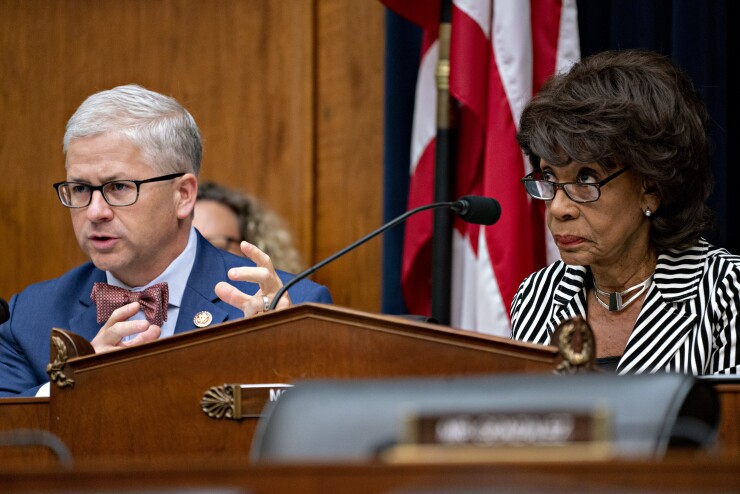WASHINGTON — A House hearing on the future of regulating debt collectors showcased a sharp divide between Democrats and Republicans over a pending proposal by the Consumer Financial Protection Bureau.
The Financial Services Committee is considering a number of proposals to protect consumers and small business owners from abusive debt collection practices, but the hearing quickly turned into a debate on whether the CFPB’s plan to restrict how often debt collectors can contact borrowers sufficiently protects consumers while ensuring loans are paid.
“The rule fails to address consumer privacy concerns and fails to protect consumers from debt collection attorneys who make misleading statements in court documents,” said House Financial Services Committee Chairwoman Maxine Waters, D-Calif. “This is unacceptable by our consumer watchdog.”
Rep. Patrick McHenry, R-N.C., the committee’s ranking member, countered that the CFPB’s rule appropriately modernizes the Fair Debt Collection Practices Act, which was signed into law in 1977.

“The proposed rule addresses the use of newer technologies; establishes clear, bright-line rules limiting call attempts and telephone conversations; and clarifies consumer protections, disclosure requirements, and communications with consumers,” McHenry said.
He added that consumers are able to opt out of certain types of communications.
“That includes opt-out instructions in every email, text message, and other electronic communication,” McHenry said. “It also addresses standards for contact through social media platforms and requires a collector to communicate with a consumer about a debt before furnishing information to a consumer reporting agency.”
The CFPB
Rep. Joyce Beatty, D-Ohio, noted that roughly one-third of the complaints from her constituents about debt collection “addressed the issue of attempting to collect a debt that is not owed.”
The hearing came as lawmakers are floating a range of bills that would, among other things, block the CFPB from allowing unlimited emails and text messages, and prohibit debt collectors from communicating with a service member's commanding officer regarding a debt.
April Kuehnhoff, a staff attorney at the National Consumer Law Center, said that the CFPB’s current proposal doesn’t ensure that debt collectors’ calls to consumers are warranted.
She noted that in the 2016 the bureau had outlined the need for "substantiation of information" and "making sure that debt collectors had the documentation to know that they were approaching the right person about the right amount."
But "that is not part of this proposal that’s before us,” she said.
Rohit Chopra, a Democratic member of the Federal Trade Commission and former CFPB student loan ombudsman, said the rule doesn’t do enough to protect consumers’ privacy, particularly when a debt collector contacts them via voicemail.
“I think the challenge is that if you leave a voicemail with someone who is not the actual person with the debt,” Chopra said.
Chopra said that enforcement in recent years by the FTC and CFPB has been insufficient in deterring abusive debt collection practices.
“I think recently enforcement has been pretty tepid and all that does is benefit bad actors and it harms those who follow the law,” Chopra said.
But Republicans on the committee defended the CFPB proposal as well as the debt collection industry.
“We cannot forget the important role debt collectors play in our economy,” said Rep. Blaine Luetkemeyer, R-Mo. He added that Congress and regulators should work “to make sure that there’s fair contact [by debt collectors], and that the consumer has to respond to it to understand that they have responsibility in the situation.”
Sarah Auchterlonie, a shareholder at Brownstein Hyatt Farber Schreck and former acting litigation deputy at the CFPB’s enforcement office, said the agency’s proposal provides clarity for debt collectors.
“The proposed rule takes a lot of the uncertainty in the current legal scheme — which for the last 40 years has been really interpreted by the courts on a court-by-court and then a circuit-by-circuit basis — and then pulls all of that information and consideration together to try to create one uniform, national rule,” Auchterlonie said.
She said that the new uniform rule would “very likely ... reduce the number of telephone calls that a person is likely to get.”





